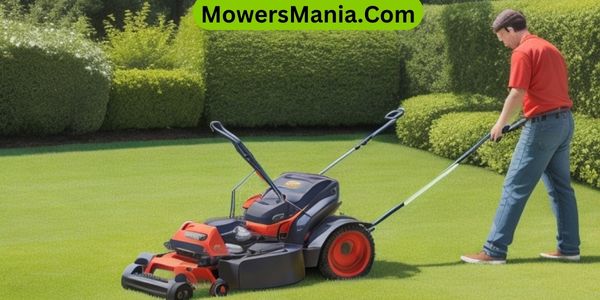Looking to upgrade your lawn mower but not sure whether to go corded or cordless? We’ve got you covered.
In this article, we’ll break down the key differences between corded and cordless lawn mowers so you can make an informed decision.

From power source comparison to mobility and maintenance requirements, we’ll cover it all. So, grab a cup of coffee and let’s dive in to find out which option suits your needs best.
Power Source Comparison
When choosing between corded and cordless lawn mowers, you may be wondering how often you’ll need to recharge the battery. Well, the frequency of battery recharging depends on a few factors.
- First, it depends on the size of your lawn. If you have a smaller lawn, the battery may last for the entire mowing session. However, if you have a larger lawn, you may need to recharge the battery in the middle of the task.
- Another factor to consider is the battery capacity. Some cordless mowers come with higher capacity batteries that can last longer before needing a recharge.
- Additionally, the type of grass you have can affect battery life. Thick and dense grass may require more power, leading to a faster battery drain.
- Lastly, the cutting height of the mower can also impact battery usage. Lower cutting heights require more power, resulting in a shorter battery life.
Mobility and Maneuverability
To ensure ease of use and efficient lawn care, consider the mobility and maneuverability of corded and cordless lawn mowers.
When it comes to mobility, cordless lawn mowers have the advantage. Since they aren’t tethered to an electrical outlet, you have the freedom to move around your yard without any restrictions. This allows you to navigate around obstacles such as trees, flower beds, and other landscaping features with ease.
With a corded mower, on the other hand, you’re limited by the length of the power cord. You need to be mindful of the cord’s position at all times to avoid running over it or getting it tangled in the blades. This can be quite inconvenient and time-consuming.
In terms of maneuverability, both corded and cordless lawn mowers offer similar features. They’re designed to be lightweight and easy to push, making it effortless to navigate through tight corners and narrow passages. However, cordless mowers tend to be slightly more maneuverable due to their cord-free design.
Noise Level and Environmental Impact

Consider the noise level and environmental impact when choosing between a corded and cordless lawn mower.
The noise level of a lawn mower is an important factor to consider, especially if you live in a neighborhood where noise regulations are in place or if you prefer a quieter outdoor environment.
Corded lawn mowers tend to be louder than cordless ones due to the constant power supply from an electrical outlet. On the other hand, cordless lawn mowers are generally quieter because they operate on battery power.
In terms of environmental impact, cordless lawn mowers are often seen as the more eco-friendly option. They produce zero emissions during operation, contributing to cleaner air quality.
Corded mowers, on the other hand, rely on electricity, which may come from fossil fuel sources, resulting in emissions and contributing to pollution.
Additionally, cordless mowers do not require the use of extension cords, which eliminates the risk of accidentally damaging trees, plants, or other objects in your yard.
To summarize the noise level and environmental impact of corded and cordless lawn mowers, refer to the table below:
| Aspect | Corded Lawn Mower | Cordless Lawn Mower |
|---|---|---|
| Noise Level | Louder | Quieter |
| Environmental Impact | Higher | Lower |
Ultimately, the choice between a corded and cordless lawn mower will depend on your specific needs and preferences, as well as any noise regulations or environmental concerns in your area.
Maintenance and Upkeep Requirements
Maintaining and caring for your lawn mower is essential for optimal performance and longevity. Regardless of whether you have a corded or cordless lawn mower, both types require regular maintenance to ensure they continue to run smoothly.
One important aspect of maintenance is keeping the blades sharp. Dull blades can damage the grass and result in an uneven cut.
You should also regularly check the air filter and clean or replace it as necessary. A clogged air filter can restrict airflow and affect the mower’s performance.
Additionally, it’s important to clean the underside of the mower after each use to remove grass clippings and debris. This helps prevent buildup and keeps the mower running efficiently.
For corded mowers, it’s important to inspect the power cord for any signs of wear or damage. Damaged cords should be replaced immediately to avoid any safety hazards.
Finally, both corded and cordless mowers require regular battery maintenance. For corded mowers, this involves checking the power supply and ensuring it’s properly connected. Cordless mowers require regular charging and battery replacement when needed.
Cost Considerations and Budgeting

When budgeting for your lawn mower, it’s important to take into account the cost of purchasing and maintaining either a corded or cordless option. Both types of mowers have their own set of expenses that you need to consider before making a decision.
Corded lawn mowers are generally cheaper to purchase upfront. They’re powered by electricity, so you don’t need to worry about buying fuel.
However, you’ll need to factor in the cost of an extension cord if you don’t already have one. Additionally, you may need to invest in a surge protector to protect your mower from power surges.
On the other hand, cordless lawn mowers tend to be more expensive upfront. They’re powered by rechargeable batteries, which means you’ll need to consider the cost of purchasing and replacing these batteries over time. It’s important to note that the cost of batteries can vary depending on the brand and model of the mower.
In terms of maintenance, corded mowers require minimal upkeep. You may need to occasionally clean the blade and check the extension cord for any damages.
Cordless mowers, on the other hand, may require more maintenance, such as regularly charging and replacing batteries.
Ultimately, when it comes to cost considerations and budgeting, you need to weigh the initial cost, ongoing maintenance expenses, and your personal preferences to make the best decision for your lawn care needs and budget.
Frequently Asked Questions [FAQs]
Are Corded Lawn Mowers More Powerful Than Cordless Ones?
Corded lawn mowers are not necessarily more powerful than cordless ones. While corded mowers provide a continuous power supply, cordless mowers have improved in recent years and now offer comparable power and performance.
Can Cordless Lawn Mowers Be Used on Larger Lawns?
Yes, cordless lawn mowers can be used on larger lawns. They offer the convenience of not being limited by a cord, allowing you to freely mow without worrying about the length of the cord.
Do Corded Lawn Mowers Require a Nearby Power Source or Can They Be Used in Remote Areas?
Corded lawn mowers require a nearby power source, so they can’t be used in remote areas. You’ll need access to an outlet or extension cord to operate them effectively.
Are Cordless Lawn Mowers More Environmentally Friendly Than Corded Ones?
Cordless lawn mowers are more environmentally friendly than corded ones. They don’t emit harmful fumes or require electricity from a power source. You can mow your lawn without worrying about pollution or limited range.
Do Corded Lawn Mowers Require More Maintenance Than Cordless Ones?
Corded lawn mowers require more maintenance than cordless ones. You have to regularly check the cords for damage and make sure they’re properly connected. With a cordless mower, you don’t have to worry about cords at all.
Conclusion
So, when it comes to choosing between a corded and cordless lawn mower, it ultimately boils down to personal preference and specific needs.
If you prioritize power and unlimited runtime, a corded mower may be the better option. On the other hand, if convenience, mobility, and ease of use are important to you, a cordless mower would be a great choice.
Consider your lawn size, power source availability, and budget before making your decision.
Happy mowing!



